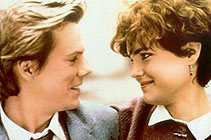|
|
|
|
She's
Having a Baby
|
 |
|
Pop Marriage About ten minutes from the end, She's Having a Baby starts getting interesting. Incredible crisis montage: a song swells, the shots flow dramatically from present to past tense, a breathtaking cut from his teardrop to her blood drop. The neon signs cueing emotion start flickering to life: love, its preciousness, the threat of its loss, the recall of all those wonderful moments shared. John Hughes really needs to pull one out of the hat by this stage. For, hitherto, She's Having a Baby has been a completely loveless, utterly sour film about marriage, domesticity and Middle American suburbia. It's meant, I fear, to be Hughes' first 'adult' film, concerned with emotional states like responsibility, commitment and reciprocity. However, Hughes seems still only to able to express the emotion that's closest to him: male adolescent self-absorption. In Ferris Bueller's Day Off (1986), that's a glorious emotion; here, it merely translates as sulking, and a resentment of all things feminine. After so much despair – the film is a late-capitalist nightmare worthy of Sirk or Fassbinder – Hughes can only affirm the marital status quo by the well-tried ideological sleight-of-hand of a last-minute crisis (you never know what you've got until you've almost lost it, etc). So that when the emotions start flickering, the signal is still too weak, too dim, too obviously contrived and desperate. Generally, I find Hughes' films engaging, involving, often quite moving. These emotions are, in fact, wholly a matter of high style – slick, fast, dynamic, and ultimately evasive, always skimming the surface, in the great Howard Hawks tradition. Usually this style works for Hughes, it clicks; you see the contrivance and it doesn't matter. This is not a bad or lamentable phenomenon; rather, it is a kind of truth. For (as Suzanne Langer told us long ago) art doesn't contain feelings per se; it mimics the shape or form of feelings. This is what Hughes has in the past intuitively understood so well: that entertainment is often the space of a completely abstract feel-good vibe and/or what Bill and Diane Routt have called "meaningless tears". So Hughes is the master of what we can term, without condescension or judgement, Pop emotion. Baby's problem is that it attempts to conjure what Jean-Pierre Léaud in Last Tango in Paris (1972) dubbed "le mariage pop" – fun, pop marriage – but can't convince itself that such a thing actually or even possibly exists. Except maybe in the final credits bonus – a montage of people suggesting a name for the newborn babe (that baby-rearing might be fun-fun-fun for yuppies is the explicit dream of at least half a dozen films of the mid to late '80s). The sequence is an ode to self-referring, idiot-grinning pop culture entertainment: the '80s TV show More Real People meets John Hughes outtakes at Dziga Vertov's editing table. It's empty, dazzling, electric, utterly violating of the diegesis, and it sends you out of the theatre strangely high, blissed out. I may not want to live by the images thrown up by such Pop emotion; but I wouldn't want to have to struggle on without that feeling, either. Pop emotion in the 21st century: Elizabethtown MORE Hughes: Home Alone 2, Weird Science, Ferris Bueller’s Day Off © Adrian Martin July 1988 |
![]()